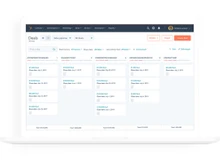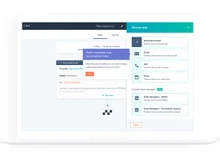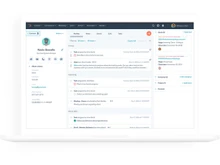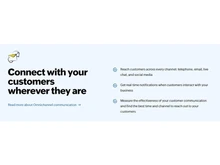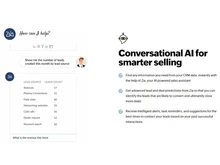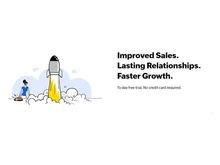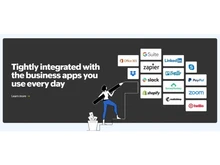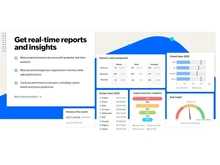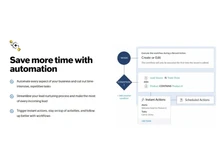HubSpot CRM and Zoho CRM are at present the top choices for companies looking to automate customer relationship management. With the wide array of features and capabilities offered by both the tools for lead management, automation, reporting, and analytics, it can be difficult to choose between HubSpot or Zoho.
We have compared the key differences between HubSpot and Zoho CRM based on features like lead management, email marketing, reporting, AI, and automation. Moreover, we have discussed in detail the pricing, integration capabilities, customization, and support of the tools so that you can decide which CRM suits your needs.
HubSpot CRM vs Zoho CRM: Overview
Zoho CRM and HubSpot CRM are power-packed CRM Software with comprehensive contact and lead management features. However, these CRMs vary widely in their core features and capabilities.
HubSpot offers a comprehensive CRM platform, equipped with sales automation and analytical features for efficient lead tracking and conversion. The software provides custom automation and various plug-ins to customize its features as per the specific requirements of different businesses.
Zoho, on the other hand, offers an intuitive CRM with basic reporting and workflow automation features. The software has all the essential features that a business needs to promote the business over online platforms. Much like HubSpot, Zoho also offers plugins and integrations to enhance its capabilities.
Choosing between HubSpot and Zoho CRM can be tricky, as both tools offer different features and functionalities for lead tracking and conversion. HubSpot, with its extensive features and integrations, fits the needs of midsize to large companies with complex internal structures. Whereas Zoho’s user-friendly and comprehensive CRM best fits the sales and marketing needs of small businesses. To pick the right software, you must evaluate your company size, business needs, objectives, and budget.
HubSpot CRM vs Zoho CRM: Pros and Cons
- HubSpot is a leading CRM tool with various sales, marketing, and analytical capabilities. Zoho, on the other hand, lacks most non-CRM features and needs add-ons to enhance its capabilities.
- However, the pricing of Zoho is less expensive in comparison to HubSpot. The pricing options for HubSpot CRM are less flexible and more expensive for small businesses.
- While HubSpot prioritizes integrations with Zoho apps, HubSpot boasts an elaborate list of integrations with native as well as third-party tools.
- Lastly, Zoho has a more customizable report template, as against HubSpot’s fewer custom report options.
HubSpot CRM vs Zoho CRM: In Terms of Features
- Contact and Lead Management: Zoho has a simple lead management system where you can add, import, and edit contacts easily. The CRM is equipped with multiple filters and extends integration capabilities with various custom reports for automated workflow.
HubSpot, however, surpasses Zoho in lead and contact management capabilities. The CRM offers integration with both native and third-party tools, along with more sorting and grouping features to manage contacts effectively. In addition to data sorting and filtering, HubSpot also has advanced features to ensure data security, fix formatting, and manage duplication of data.
- Email Marketing: In Zoho CRM, you can create basic email campaigns directly within the software. By connecting your inbox with the CRM, you can send emails to leads and contacts directly from the dashboard.
On the other hand, HubSpot's email platform offers a more intuitive and dedicated email marketing experience. Creating new campaigns is straightforward, as the software offers a drag-and-drop email builder and multiple pre-defined templates. HubSpot wins the comparison here with its advanced capabilities to design visually appealing emails tailored to your specific needs.
- Report Generation: HubSpot offers a plethora of reporting templates along with the option to create custom reports as per your needs. However, the customizable reports can only be unlocked after upgrading to the professional plan.
Although Zoho CRM has custom reporting options, the learning curve is steep, and it is difficult to set up customized reports. A point to be noted is that, as against HubSpot, the custom reports in Zoho are available in all the paid plans.
- Automation: Workflow automation is more defined in HubSpot with the option of using presets or building automation workflow from scratch. The downside being a limited number of instances in the entry-level plan to create an automated workflow.
When compared to HubSpot, Zoho allows an unlimited number of automation instances in all the paid plans. By upgrading to premium pricing plans, the users can also gain automation suggestions for streamlining their workflow. However, leveraging fully the automation tools in Zoho CRM is tricky due to its complex interface.
- AI Features: The AI features in Zoho CRM automate tasks like lead data extraction, trend forecasting, sales performance analysis, and suggestions to schedule messages. Zia, Zoho’s AI chatbot helps in performing multiple tasks in a single click.
In addition to an AI chatbot, HubSpot also has integrated AI assistance for different features. Additionally, the CRM provides machine learning capabilities through predictive forecasting using historical data. Comparing Zoho vs HubSpot CRM for AI features, we find HubSpot as a clear winner with its AI integrations and sales forecasting.
- Omnichannel Support: Zoho CRM offers integration with Zoho Social which allows you to manage your presence on multiple social media channels, including Instagram, LinkedIn, Facebook, Twitter, Google My Business, TikTok, and Pinterest. Although the list of channels available is elaborate, the pricing plans can get expensive per user.
In contrast, HubSpot CRM has a native social media management tool for Professional and Enterprise pricing plans. The tool enables customer tracking, post-scheduling, social media interactions, ad placement, and more. However, the support is restricted to LinkedIn, YouTube, Instagram, Facebook, and Twitter.
HubSpot CRM vs Zoho CRM: Onboarding
For users looking for quick onboarding, HubSpot CRM is the right choice when compared to Zoho CRM. Configuration and onboarding in Zoho can be a lengthy and time-consuming process. Streamlining workflow, importing contacts, creating custom fields, and performing other onboarding activities can take up to two months of dedicated effort.
HubSpot CRM gets the job done in a couple of days as the users can get started with their sales and lead tracking activities right after set-up.
HubSpot CRM vs Zoho CRM: Integrations
Both Zoho and HubSpot offer a long list of third-party integrations to enhance the functionality of the CRM. The tools integrate seamlessly with popular marketing, sales, and accounting tools to extend their capabilities.
However, Zoho gives preference to integrations with Zoho’s native applications over other third-party tools. On the other hand, HubSpot CRM enables over 1000 custom integrations as per customer needs, making it the CRM of choice when comparing Zoho CRM vs HubSpot CRM.
HubSpot CRM vs Zoho CRM: User Interface
The user interface in Zoho CRM is complicated and involves a learning curve to get used to it. Exploring basic features and functionalities can be tricky as the dashboard lacks quick access to different features.
HubSpot, on the contrary, has a user-friendly interface. The features in HubSpot CRM are divided into distinct categories, making it easy to access different functions.
HubSpot CRM vs Zoho CRM: Customization
Zoho has an edge over HubSpot when it comes to customization features. Zoho CRM offers unlimited customization in workflow automation and report generation to enhance user experience and automate the routine tasks of users.
Although HubSpot CRM has customization features, the tool is not as flexible as Zoho, and the number of custom fields is limited in the paid plans.
HubSpot CRM vs Zoho CRM: Support
The tech support offered by HubSpot CRM wins this round of comparison between HubSpot vs Zoho. The starter pack of HubSpot provides email and live chat support round the clock, while the Enterprise and Professional plans enable call support as well.
Zoho on the other hand, offers limited support over email, calls, and online chat. The low-tier plans also have a time-bound support system, which can take many hours to resolve the issues.
HubSpot CRM vs Zoho CRM: Pricing
The pricing plans of Zoho are more budget-friendly, as compared to HubSpot. Zoho offers flexible and affordable pricing options that fit the needs of small businesses looking for a comprehensive CRM tool.
Although HubSpot CRM offers more features in its paid plans, the pricing options can be daunting. The pricing plans lack flexibility and to access its features, users need to upgrade to premium plans. Moreover, HubSpot charges per user, which can significantly escalate the total cost of the CRM. Zoho, however, enables access to unlimited users at a fixed price, making it the better choice for users seeking an affordable CRM.
Which is Better, HubSpot CRM or Zoho CRM?
The answer to which one is better out of the two CRMs depends on factors such as features, pricing, integrations, user interface, and support. While HubSpot CRM stands out for its comprehensive set of features, Zoho CRM provides an intuitive interface with basic reporting and workflow automation features at affordable pricing options.
Comparing HubSpot CRM vs Zoho CRM leads us to the conclusion that both software fit different user requirements. HubSpot’s extensive features, integrations, and support make it suitable for large businesses, whereas the affordable pricing plans and simple interface of Zoho CRM suit the needs of small businesses.


 16 Ratings & 16 Reviews
16 Ratings & 16 Reviews









